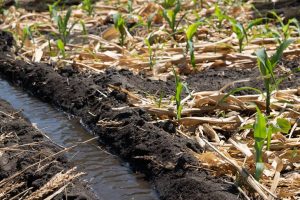
Binding resource constraints in many low- and middle-income countries aggravate food insecurity risk in the face of climate change. To help mitigate such risk and increase food security, international development agencies have invested billions of dollars in climate-smart agriculture (CSA) programs over the past decade. However, evidence on the food security impacts of CSA aid through crop yields remains limited generally, and specifically in Africa south of the Sahara. Most studies have not explicitly linked CSA adoption and yield impacts with CSA aid interventions among smallholder farmers.
A recent study, published in the journal Food Policy, responds to this knowledge gap. The study with the title Yield effects of climate-smart agriculture aid investment in southern Malawi estimates the impact of a major CSA aid effort, the United States Agency for International Development-funded Wellness and Agriculture for Life’s Advancement (WALA) project, on agricultural yields in southern Malawi.
Based on primary survey data from a sample of 808 households in the project area, the study team estimate CSA adoption and impacts on maize yield in 2016, controlling for (1) potential program placement bias, (2) selection bias in CSA adoption, and (3) endogeneity issues. The study team undertook a detailed agricultural production accounting with respect to maize under CSA adoption and found that factors such as hired labor (82%), perceived benefits of CSA on soil fertility (73%), and extension visits (136%) positively influenced CSA adoption. The study team found a 53% increase in maize yields among CSA adopters in the drought year of 2016.
The study results demonstrate that CSA adoption is critical for higher crop yields and that policies and funding streams supporting CSA in low-income, dryland contexts such as southern Malawi can have important impacts on food security by boosting crop yields in the face of increasing climate uncertainty and extreme weather shocks.
Authors: Festus O. Amaduab, Paul E. McNamarab, Daniel C. Millerb, April 2020.
a Department of Natural Resources and Environmental Sciences, University of Illinois at Urbana-Champaign, USA, 406 Turner Hall, 1102 S. Goodwin Ave., Urbana, IL 61801, USA
b Department of Agricultural and Consumer Economics, University of Illinois at Urbana-Champaign, USA
Click here to download and read the article.
Further reading:
Amadu, F. O., P. E. McNamara, D. C. Miller. 2020. "Understanding the Adoption of Climate Smart Agriculture: A Farm-Level Typology with Empirical Evidence from Southern Malawi." World Development 125. To read the article click here.
Amadu, F. O., D. C. Miller, P. E. McNamara. 2020. "Agroforestry as a Pathway to Agricultural Yield Impacts in Climate-Smart Agriculture Investments: Evidence from Southern Malawi." Ecological Economics 167. To read the article click here.
Festus O. Amadu was a Borlaug LEAP Fellow in 2015/16. During that time, he undertook an internship with IFPRI supervised by Kristin Davis and working closely with the Strengthening Agriculture and Nutrition Extension project in Malawi, directed by Paul E. McNamara. He also received contextual support from technical staff at Catholic Relief Services regarding the WALA project. During an IFPRI brownbag seminar in Lilongwe in September 2016 he presented on Agricultural Extension, Climate Smart Agriculture, and Food Security in Southern Malawi.
